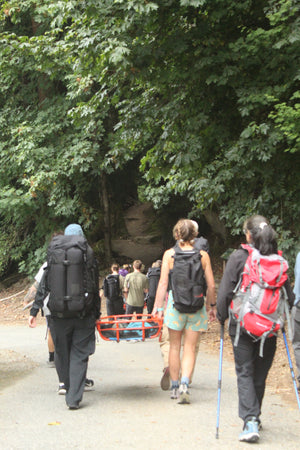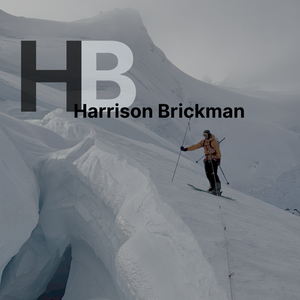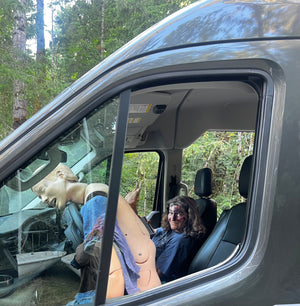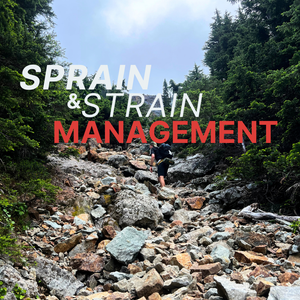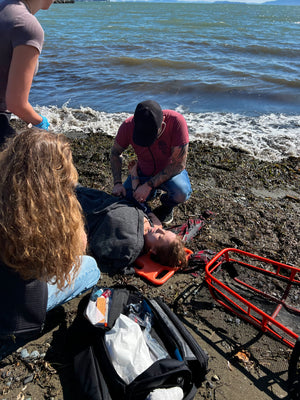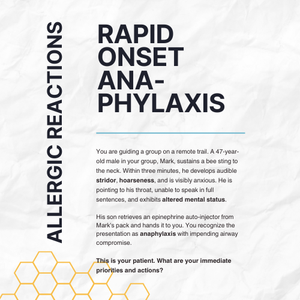Miller's Landing - Student Guide & Logistics
This guide contains essential information to help you prepare for your upcoming course at Millers Landing. Please review it carefully to ensure a smooth and successful training experience in the heart of the Alaskan wilderness.
Location & Arrival
Your course will be held at Millers Landing, a historic family homestead established in 1950 on the shores of Resurrection Bay. This secluded, working waterfront facility provides an authentic and immersive environment for hands-on medical training, with direct access to the rugged landscapes of Kenai Fjords National Park.
Facility Address: Millers Landing Miller's Landing Rd, Seward, AK 99664
Driving Directions:
From Anchorage (Approx. 2.5 hours): Take the Seward Highway (AK-1 S) south for approximately 125 miles. After entering Seward, continue straight onto 3rd Ave. Turn right onto Lowell Point Rd. Continue for approximately 2 miles, then turn left onto Miller's Landing Rd. The facility is at the end of the road.
Please Note: The final section of road is gravel. Drive cautiously.
Transportation: Students are responsible for their own transportation. We highly recommend coordinating with classmates via the Student Portal to arrange carpools or shared rental vehicles.
Preparing for Your Stay
Weather & Environment Millers Landing is situated in a dynamic coastal environment where weather can change in an instant. Be prepared for a wide range of conditions, including rain, wind, cool temperatures, and occasional brilliant sunshine—often all in the same day. Dressing in layers is absolutely essential.
Check the Local Forecast: Weekly Forecast for Seward, Alaska
Lodging & Meals Package
Millers Landing is offering an affordable and convenient housing and meal package for students, allowing you to focus entirely on your training without the hassle of meal prep or commuting.
Package Includes:
Accommodations: Stay in our charming beach-front camping-style cabins, designed for comfort and privacy. Each cabin accommodates two guests and features a wood stove for warmth and breathtaking views of the surrounding wilderness. Cabins include three beds (one downstairs, two in a loft) for ample space and privacy.
Meals: A delicious, hand-crafted breakfast and lunch is prepared fresh each day in our on-site café.
Amenities: Access to on-site laundry services and a shower house (token-operated).
Package Pricing & Duration:
- Wilderness First Responder (Full Course): $400 for six nights.
Dates: Check-in the night of April 22nd, check-out on the morning of April 27th.
- WFR Recertification: $160 for two nights.
Dates: Check-in the night of April 25th, check-out on the morning of April 27th.
To secure this all-inclusive package and book your stay, please visit the Millers Landing booking page:
www.millerslandingak.com
We highly recommend booking early, as space is limited. The cabins are located next to the café where class activities are held, providing a truly immersive and worry-free learning experience.
Connectivity: Cell service can be unreliable. Wireless internet is available in the main cafe and lodge areas. Embrace the opportunity to disconnect and immerse yourself fully in the course and natural surroundings.
Recreation: The campus offers direct beach access, and we are your gateway to Kenai Fjords National Park. Wildlife sightings (sea otters, bald eagles, whales) are common right from shore. In the summer, fishing charters and guided kayaking tours depart directly from our dock.
Get a Feel for the Location: Check out Millers Landing on Instagram
Accessibility & Policies: Please contact us directly to discuss specific accessibility needs. Smoking is permitted only in designated outdoor areas.
Required Packing & Gear List
Proper preparation is critical for your success and comfort in Alaska. Your gear will be used in realistic scenarios and exposed to the elements. The coastal environment is often wet and cool, even in summer.
Essential Course Items
Watch with a Second Hand: Mandatory for taking patient vitals. A simple, durable watch is sufficient.
Government-Issued Photo ID: Required for check-in.
Note-Taking Materials: A waterproof notebook (e.g., "Rite in the Rain") and several pens/pencils are highly recommended.
Backpack (20-30L): To carry your gear, water, and layers to and from training sites each day.
Headlamp or Flashlight: With extra batteries. Essential for Alaska's long summer twilight hours and low-light scenarios.
Clothing System
You will need two distinct sets of clothing: one for scenarios and one for classroom/personal time. Scenario clothing will get dirty, stained with simulated blood, and may be damaged. Do not bring expensive items for this purpose.
1. Scenario & Field Clothing (Durable & Functional – Will Get Dirty)
Sturdy Waterproof Boots (2 pairs if possible): Closed-toe, broken-in, and waterproof. This is non-negotiable for wet, rocky shorelines.
Durable "Scenario" Pants (2 pairs): Quick-dry hiking pants or old jeans.
"Scenario" Shirts (2-3): Long sleeves are highly recommended for protection from brush and cool weather.
Warm "Scenario" Mid-Layer: A thick fleece or hoodie you don’t mind getting dirty.
2. General & Classroom Clothing (Comfort & Layers)
Waterproof Rain Jacket & Rain Pants: Your most important layer. Must be truly waterproof, not just water-resistant.
Warm Insulating Jacket: A synthetic puffy or thick fleece jacket is essential for chilly mornings and evenings.
Base Layers (Thermal Underwear): Both top and bottom synthetic or wool layers are critical for staying warm and dry.
Warm Hat (Beanie), Gloves, and Neck Gaiter/Buff: Required. The wind off the bay can be biting.
Socks: Multiple pairs of wool or synthetic hiking socks.
Comfortable Shoes: For evenings and classroom time.
Sun Protection: Sun hat, sunglasses, and sunscreen. It can be surprisingly bright.
Personal & Optional Items
Water Bottle (1L minimum): A reusable bottle is essential.
Personal Medications & Toiletries.
Personal First-Aid Kit: For minor needs like blisters or headaches.
Laptop or Tablet: Recommended for reviewing course materials.
Portable Power Bank: Useful for keeping devices charged.
Snacks: Bring personal snacks for extra energy during long training days.
Camera: To capture the incredible scenery and wildlife.
We look forward to welcoming you to Alaska and providing an unforgettable training experience at Millers Landing
